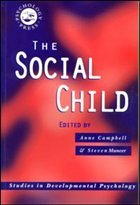Table of contents:
Something happened - fission and fusion in developmental psychology, S. Muncer, A. Campbell; evolution and development, K. MacDonald; genes, environment and psychological development, D. Rowe; cultural influences on development, G. Jahoda; families and social development - towards the 21st century, M. McGurk, G. Soriano; the company they keep - friendships and their developmental significance, W. Hartup; social life in the primary school, P. Kutnick, Ian Mason; technology, media and social development, C. Crook; the developmental origins of social understanding, D.F. Hay, H. Demetrious; Children's Perspective And The Emotional process, M. Meerum Terwogt, H. Stegge; agency and identity - a relational approach, J. Shotter; socio-moral understanding, N. Emler; gender and the development of interpersonal orientation, A. Campbell; youth crime and antisocial behaviour, D.P. Farrington.
Research in the field of human social development is moving at an astonishing pace. Within psychology, children's social behaviour has attracted interest from cognitive, social, clinical, and educational psychologists employing a wide variety of techniques that range from conversational analysis to experimental designs. Contributions have also come from beyond the domain of traditional psychology such as evolutionary theorists, behaviour geneticists, cultural anthropologists, and ethologists. This book aims to bring the reader to the cutting edge of this work by including original contributions from those in the very forefront of their discipline. Each contributor has spent years working in their specialist area and the authors have been given the freedom to argue for very different positions on the origins and sequence of children's social competence. The Social Child brings together controversial and sometimes conflicting positions on issues of central importance to society. It considers the likely impact of rising divorce rates and single parenting, how media images affect children's understanding and behaviour, how genes inform development, the role parents have, whether changing sex roles have had an impact on children's social interactions, and the sources from which children acquire behaviour. This book will be relevant to those interested in children's behaviour both professionally (social workers, teachers, educational psychologists, therapists, youth workers) and academically. It can also be used as a textbook for second and third year undergraduates and by postgraduates.
This tutorial textbook on child psychology includes chapters by academics in research areas as diverse as evolutionary and cross-cultural psychology, behavioural genetics, social cognition, and media influence on child behaviour.
Something happened - fission and fusion in developmental psychology, S. Muncer, A. Campbell; evolution and development, K. MacDonald; genes, environment and psychological development, D. Rowe; cultural influences on development, G. Jahoda; families and social development - towards the 21st century, M. McGurk, G. Soriano; the company they keep - friendships and their developmental significance, W. Hartup; social life in the primary school, P. Kutnick, Ian Mason; technology, media and social development, C. Crook; the developmental origins of social understanding, D.F. Hay, H. Demetrious; Children's Perspective And The Emotional process, M. Meerum Terwogt, H. Stegge; agency and identity - a relational approach, J. Shotter; socio-moral understanding, N. Emler; gender and the development of interpersonal orientation, A. Campbell; youth crime and antisocial behaviour, D.P. Farrington.
Research in the field of human social development is moving at an astonishing pace. Within psychology, children's social behaviour has attracted interest from cognitive, social, clinical, and educational psychologists employing a wide variety of techniques that range from conversational analysis to experimental designs. Contributions have also come from beyond the domain of traditional psychology such as evolutionary theorists, behaviour geneticists, cultural anthropologists, and ethologists. This book aims to bring the reader to the cutting edge of this work by including original contributions from those in the very forefront of their discipline. Each contributor has spent years working in their specialist area and the authors have been given the freedom to argue for very different positions on the origins and sequence of children's social competence. The Social Child brings together controversial and sometimes conflicting positions on issues of central importance to society. It considers the likely impact of rising divorce rates and single parenting, how media images affect children's understanding and behaviour, how genes inform development, the role parents have, whether changing sex roles have had an impact on children's social interactions, and the sources from which children acquire behaviour. This book will be relevant to those interested in children's behaviour both professionally (social workers, teachers, educational psychologists, therapists, youth workers) and academically. It can also be used as a textbook for second and third year undergraduates and by postgraduates.
This tutorial textbook on child psychology includes chapters by academics in research areas as diverse as evolutionary and cross-cultural psychology, behavioural genetics, social cognition, and media influence on child behaviour.

